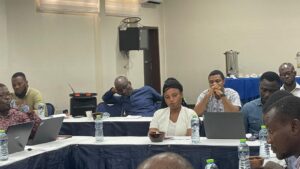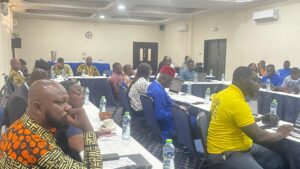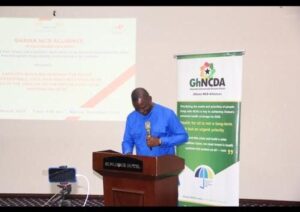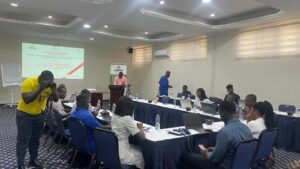
The Ghana NCD Alliance has called on the government to include more Non-Communicable Diseases (NCDs) in the National Health Insurance Scheme (NHIS) benefits package. This call to action comes ahead of the Fourth UN High-Level Meeting on NCDs, scheduled for September 2025.
Labram Musah, National Coordinator of the Ghana NCD Alliance, made this call during a one-day capacity-building seminar for media professionals, CSOs, and persons living with NCDs in Accra.
The current NHIS package does not fully cover essential NCD services, making it difficult for people living with NCDs to manage their conditions," Musah said. "We need to prioritize the health and well-being of our citizens, and expanding NHIS coverage is a crucial step in that direction."
Musah emphasized that NCDs pose a significant burden on Ghana's healthcare system, accounting for 45% of mortality in the country, up from 43% in previous years. He also highlighted the catastrophic health spending associated with NCDs, which pushes many households into poverty.
NCDs are not just a health issue, but also an economic and social one," Musah said. "We need to take a comprehensive approach to addressing the NCD burden, and that includes expanding NHIS coverage, increasing funding for NCDs, and promoting preventive healthcare."
 The Ghana NCD Alliance's call to action is timely, as the country prepares to participate in the Fourth UN High-Level Meeting on NCDs. The meeting aims to accelerate progress toward Sustainable Development Goal (SDG) 3.4 and Universal Health Coverage (UHC) in the context of NCDs.
The Ghana NCD Alliance's call to action is timely, as the country prepares to participate in the Fourth UN High-Level Meeting on NCDs. The meeting aims to accelerate progress toward Sustainable Development Goal (SDG) 3.4 and Universal Health Coverage (UHC) in the context of NCDs.
In anticipation of the meeting, the Ghana NCD Alliance, in collaboration with the Media Alliance in Tobacco Control and Health (MATCOH) and PRINPAG, organized the one-day capacity-building seminar to strengthen the capacity of stakeholders to understand Ghana's current NCD landscape, Ghana’s role in the upcoming high-level meeting, and the importance of increased government commitment to accelerating progress toward SDG 3.4 and UHC in the context of NCDs.
The growing burden of Non-Communicable Diseases (NCDs) in Ghana cannot be ignored," warns Jeorge Wilson Kingson, Chairman of the Media Alliance in Tobacco Control and Health (MATCOH). "These diseases now account for about 45% of all mortality in the country, a figure that has risen steadily over the years".
Speaking at a capacity-building seminar on NCDs for journalists, CSOs, and persons living with NCDs, Kingson emphasized the need for stronger government commitment to addressing the NCD crisis. "The challenges in the health sector, such as high treatment costs, inequitable access to healthcare, and insufficient mental health support, only compound the suffering of those affected by NCDs".
 The seminar, organized by the Ghana NCD Alliance in collaboration with MATCOH and the Private Newspapers and Online News Publishers Association of Ghana (PRINPAG), aimed to equip participants with the knowledge and tools to advocate for stronger government action ahead of the 4th UN High-Level Meeting on NCDs in September 2025.
The seminar, organized by the Ghana NCD Alliance in collaboration with MATCOH and the Private Newspapers and Online News Publishers Association of Ghana (PRINPAG), aimed to equip participants with the knowledge and tools to advocate for stronger government action ahead of the 4th UN High-Level Meeting on NCDs in September 2025.
Wilson stressed the importance of accelerating progress toward Sustainable Development Goal (SDG) 3.4—reducing premature mortality from NCDs—and achieving Universal Health Coverage (UHC) for all. "We want to enhance the ability of journalists and CSOs to communicate effectively about NCDs and UHC, as well as to engage with policymakers and push for the prioritization of NCDs in our national health agenda".
 While acknowledging Ghana's progress in addressing NCDs, such as the introduction of wellness clinics and the free dialysis program for chronic kidney disease patients, Wilson noted that significant challenges remain. "The road ahead is still long, and the need for increased government investment in healthcare, particularly in NCD prevention and mental health services, is more urgent than ever".
While acknowledging Ghana's progress in addressing NCDs, such as the introduction of wellness clinics and the free dialysis program for chronic kidney disease patients, Wilson noted that significant challenges remain. "The road ahead is still long, and the need for increased government investment in healthcare, particularly in NCD prevention and mental health services, is more urgent than ever".
Kingson concluded his speech by urging participants to use the seminar as an opportunity to strengthen their resolve and advocate for sustainable action on NCDs. "Let us be proactive in ensuring that our voices are heard in the policy-making process. Together, we can hold our government accountable, advocate for sustainable action on NCDs, and ultimately improve the health and well-being of all Ghanaians".
Why the UN High-Level Meeting on NCDs Matters
According to Jessica Quach, Senior Capacity Development Officer- NCD, the upcoming UN High-Level Meeting on Non-Communicable Diseases (NCDs) is a critical opportunity to elevate the NCD issue to the global, political, and development space.
The UN High-Level Meeting matters because it brings NCDs to the forefront of the global health agenda," Quach emphasized. "It's a chance for world leaders to acknowledge the devastating impact of NCDs and commit to taking concrete actions to address this growing crisis."
Quach highlighted that the process leading up to the meeting is just as important as the outcome. "The meeting is a stepping stone towards the post-Sustainable Development Goals (SDGs) era," she noted. "It's an opportunity for governments, civil society, and other stakeholders to come together and shape the future of NCD prevention and control."
The UN High-Level Meeting on NCDs is scheduled to take place in September 2025, and it's expected to bring together world leaders, health experts, and civil society representatives to discuss ways to accelerate progress in reducing premature deaths from NCDs.
As Quach pointed out, the meeting is a critical moment for the global community to come together and address the growing burden of NCDs. "We need to seize this opportunity to make a meaningful impact on the lives of millions of people around the world who are affected by NCDs," she urged.
The seminar brought together media professionals, CSOs, and persons living with NCDs to discuss the NCD burden in Ghana and the need for increased government commitment to addressing the issue.
 Participants at the seminar emphasized the need for a multi-sectoral approach to addressing the NCD burden, including increased funding, improved healthcare infrastructure, and enhanced community awareness and education.
Participants at the seminar emphasized the need for a multi-sectoral approach to addressing the NCD burden, including increased funding, improved healthcare infrastructure, and enhanced community awareness and education.
The Ghana NCD Alliance's call to action is a critical step towards addressing the NCD burden in Ghana and ensuring that all citizens have access to quality healthcare.
As the country prepares for the Fourth UN High-Level Meeting on NCDs, the Ghana NCD Alliance will continue to advocate for increased government commitment to addressing the NCD burden and ensuring that all citizens have access to quality healthcare.
Comments